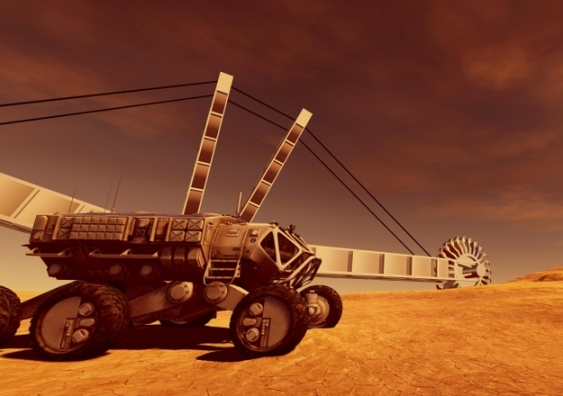Australia could be a global leader in off-earth mining
Forum will bring Australia’s space community together to shape a collective vision for the nation’s space endeavours.
Forum will bring Australia’s space community together to shape a collective vision for the nation’s space endeavours.

Louise Templeton
Corporate Communications
+61 (0)413 495 994
louise.templeton@unsw.edu.au
The Australian Centre for Space Engineering Research (ACSER) and UNSW’s School of Minerals and Energy Resources Engineering aim to unite the Australian space community, when they host the fourth Off-Earth Mining Forum in Sydney on 21-22 November.
The forum will bring together leading local and international space and mining experts, researchers, lawyers, financiers, economists and government, to discuss how Australia can capitalise on its strengths and position itself as a major player in the global space industry. The industry is expected to be worth USD$1 trillion by 2030.
Speakers will include Director of ACSER, UNSW Professor Andrew Dempster and his co-chair for the event, Professor Serkan Saydam; General Manager of remote robotics manufacturer, Fugro, Sam Forbes; and co-founder of Space IL, Kfir Damari, who ran the world's first privately funded spacecraft mission to the moon.
Professors Dempster and Saydam are leading ASCER’s research to create the first commercially viable mission to mine and process water on the moon. Professor Dempster is adamant that their project will only consider economically feasible mission designs, methodologies and technologies, to give the team and their partners the best chance of success.
“If we are serious about Australia sharing the potential benefits of the new space economy and space resources, then we must look at making space ventures commercially viable and environmentally sustainable,” Professor Dempster said.
“Australia leads the world in mining methodology and technologies, and has deep expertise in many other areas critical to space exploration. Our large land mass and location in the southern hemisphere also gives us a strategic advantage.
“We need to exploit these strengths and take the lead, or miss out on an enormous opportunity for our country’s future.”
Space exploration and missions require a huge range of complementary products and services, including communications, navigation, robotics, artificial intelligence, biology and medicine. It has the potential to create tens of thousands of jobs in Australia.
NASA estimates that every dollar spent on its space program adds $10 to the US economy.
Professor Saydam said that Australians also benefit from many space-based services and technologies in every-day life.
“Many Australians rely on satellite communications for connectivity; transportation and logistics companies use positioning technologies to track their fleets; and mining and resource industries use satellite imagery for exploration,” Professor Saydam said.
“Investment in space science and technology is also a valuable source of innovation for earth-based industries,” he said.
“Products such as baby formula, freeze-dried foods, infrared ear thermometers, your scratch-resistant sunnies, WIFI – these were all developed from technology made for space.”
Professors Dempster and Saydam agree there is a big upside to space exploration and mining. The pair hopes the Off-Earth Mining Forum will be an opportunity to update the Australian and global community on the latest developments in the space industry’s rapidly changing environment.
Professor Dempster said: “We want to bring everyone together to expand the space community, to get everyone talking to each other and focus our efforts, to move the Australian space industry forward.”
The Off-Earth Mining Forum will take place at UNSW Sydney on 21-22 November. The event is open to everyone. Program and registration details are available here.